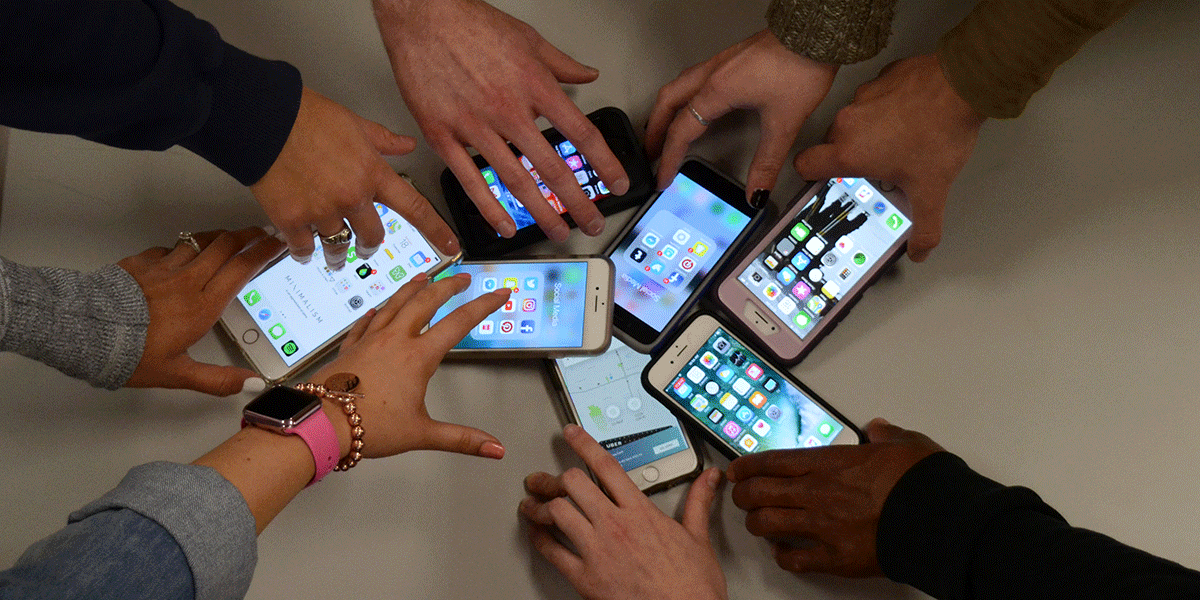Technological advances have changed the way people communicate and made the world a much smaller place, but the convenience of these advances may be making face-to-face communication a lost skill.

Photo by Ben Randolph
Whether making a call, sending a Snapchat, indulging in social media or getting a ride from Uber, the convenience of reaching for a cell phone has replaced hours of time with the tap of an app.
__________________________________________________
Growing up in a generation who aged with the advances of the cell phone has provided new opportunities unknown to generations before, but has this actually led to a regression in human communication? According to Flurry, an analytics firm that monitors trends and habits of mobile users, “the average U.S. consumer spends a whopping five hours a day on these devices.” With wireless access to the Internet and a seemingly unlimited number of apps available, these consumers can spend that time doing numerous activities, from FaceTiming your best friend to crushing candy to posting a picture from your favorite restaurant on Instagram. “I don’t usually put away my phone until I go to bed at the end of the day,” said Morgan Mell, a senior psychology major from Troy, Illinois. “And I spend most of my time on social media, diagnosing myself with certain medical conditions or watching cat videos.” Like Mell, social media takes up a majority of many mobile users’ time, and the duration spent connecting to the world online is growing exponentially. Teens now spend up to nine hours a day on social platforms, while 30 percent of all time spent online is now allocated to social media interaction. Some 60 percent of social media time spent is facilitated by a mobile device, according to research by SocialMediaToday. “The average 8-18-year-old uses technology more than 8 hours per day, not including time spent texting, and when you factor in media multitasking, that number jumps to well over 10 hours of technology usage per day,” said Dr. Holly Brand, professor of psychology at MBU, in an email referencing the Kaiser report on media usage. “Heavy technology usage limits time spent building relationships.” Allie Heinz, a junior behavioral science major from Troy, Missouri, is another avid social media user who spends an average of five hours a day on her phone. “Most of that time is spent watching Facebook videos and on Snapchat,” said Heinz. “Whenever I’m bored it is something that is just there to do.” Having the ability to get instant information on any subject from virtually anywhere can allow people to gain knowledge and connect to those around them with ease, but many believe this convenience can actually be a hindrance, including some who admit to overusing their devices. “We should definitely spend less time on our phones,” said Matt Williams, a communications studies graduate from Vienna, Illinois. “I think that if you’re as bad at it as I am, then turn it off and put it away. I would love to say to just do that, but it is hard. When I have friends over, I literally turn my phone off and put it away somewhere.” “With the amount of technology use, eye contact and face-to-face communication has dwindled,” said Brand. “Research shows that adolescents are having a more difficult time reading people’s facial cues and interpreting their expressions because they are simply lacking that developmental experience.” As technology advances continue to change the way people communicate, only time will tell if this lack of developmental experience will get better or worse. “I think as technology grows it will be cool but it will negatively shape us, and then we will get to a point where we realize how we interact together is not adequate for personal relationships,” said Eleanor Preis, a senior health science major from St. Louis. A study completed by psychologists at the University of Essex revealed even having a cell phone in view disrupts important conversations, lowers relationship quality and sends a message saying you could stop talking at any moment to start a different conversation. “How awful would it be to go out on a date with a girl or guy and have them be on their phone the entire time. … it would be awful,” said Cassandra Willhite, a senior behavioral science major from St. Charles, Missouri. With growth in technology, the amount of face-to-face social interaction has lessened with the innovation of new, convenient ways to accomplish daily tasks. Snapchat allows users to send messages in 10 seconds or less, apps like GrubHub and Postmates provide delivery services for food and groceries to your home and now people show affection through a tap on a like button. “Interacting in person is something that we just don’t practice as much anymore, so it is a skill that people are getting worse at,” said Kasey Cox, assistant professor of theatre at MBU. “I don’t know if that is necessarily a bad thing, because that is the direction society is going, but I don’t see that changing in the future.” Growth is inevitable and new adaptations to technology will undoubtedly make the pace of life progressively faster, but maybe people should take the time to slow down by putting their phones aside and use their voices how they were intended. “I firmly believe that God created us for relationships and gave us the clear tools to communicate. A brain center devoted to speech production and speech comprehension, a mouth, two ears, the ability to speak and listen, eyes to look into another’s and so on. So, the bottom line is God’s plan cannot be thwarted, and that’s a good thing,” said Brand.